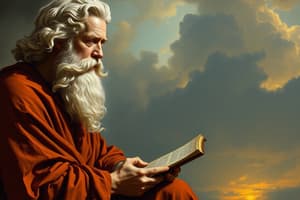Podcast
Questions and Answers
What does David Hume identify as the primary nature of the self?
What does David Hume identify as the primary nature of the self?
- A static entity that remains unchanged
- An entity that exists beyond physical experience
- A bundle of ideas
- A collection of impressions (correct)
How does Kant differ from Hume regarding the nature of impressions?
How does Kant differ from Hume regarding the nature of impressions?
- Kant argues that impressions are purely instinctual drives.
- Kant believes impressions are randomly experienced.
- Kant recognizes a need for a mind to organize impressions. (correct)
- Kant asserts that impressions do not affect knowledge acquisition.
What does Freud's conception of the self involve?
What does Freud's conception of the self involve?
- An entity that transcends human experience
- A collection of societal influences
- A multilayer structure of conscious and unconscious (correct)
- A single, unified consciousness
Which of the following best describes Hume's concept of impressions?
Which of the following best describes Hume's concept of impressions?
According to Kant, what role does the self play in relation to perceptions?
According to Kant, what role does the self play in relation to perceptions?
What does the unconscious level in Freud's model primarily contain?
What does the unconscious level in Freud's model primarily contain?
What critique does Kant have regarding Hume's perception of the self?
What critique does Kant have regarding Hume's perception of the self?
How does the conscious self operate according to Freud?
How does the conscious self operate according to Freud?
What are the two aspects of the self according to William James?
What are the two aspects of the self according to William James?
What does global self-worth refer to?
What does global self-worth refer to?
What is the process of self-differentiation primarily concerned with?
What is the process of self-differentiation primarily concerned with?
Which of the following concepts is NOT synonymous with global self-worth?
Which of the following concepts is NOT synonymous with global self-worth?
What does Carl Rogers' concept of self-schema refer to?
What does Carl Rogers' concept of self-schema refer to?
What is the primary difference between identity and self-concept?
What is the primary difference between identity and self-concept?
What does self-esteem typically indicate in terms of global self-worth?
What does self-esteem typically indicate in terms of global self-worth?
In the context of self-differentiation, what is essential for effectively navigating conflicts?
In the context of self-differentiation, what is essential for effectively navigating conflicts?
What do Jen, Yi, Li, and Chih represent in the pre-self concept?
What do Jen, Yi, Li, and Chih represent in the pre-self concept?
According to the Confucian perception, personality is viewed as:
According to the Confucian perception, personality is viewed as:
How is the concept of self perceived in Confucianism compared to Western thinking?
How is the concept of self perceived in Confucianism compared to Western thinking?
The term 'pre-self' refers to:
The term 'pre-self' refers to:
Which heart virtue corresponds to wisdom in the pre-self concept?
Which heart virtue corresponds to wisdom in the pre-self concept?
What is the ultimate goal in Confucianism related to the concept of self?
What is the ultimate goal in Confucianism related to the concept of self?
Which virtue is associated with the heart of compassion?
Which virtue is associated with the heart of compassion?
Why is understanding the self seen as a process in Confucian teachings?
Why is understanding the self seen as a process in Confucian teachings?
What best defines technologies of the self according to the provided content?
What best defines technologies of the self according to the provided content?
How does Foucault's notion of power differ from traditional views?
How does Foucault's notion of power differ from traditional views?
Which of the following terms refers to the activities that shape an individual's identity in relation to culture?
Which of the following terms refers to the activities that shape an individual's identity in relation to culture?
What role do autobiographies and diaries play in understanding technologies of the self?
What role do autobiographies and diaries play in understanding technologies of the self?
Which statement best captures the concept of the self in modern society?
Which statement best captures the concept of the self in modern society?
How do different institutions influence the self, according to the content?
How do different institutions influence the self, according to the content?
What topic shifted the discussion away from the body-soul debate in philosophy?
What topic shifted the discussion away from the body-soul debate in philosophy?
What do self-discipline and self-disclosure contribute to an individual's identity development?
What do self-discipline and self-disclosure contribute to an individual's identity development?
What is the primary influence of self-efficacy on individuals?
What is the primary influence of self-efficacy on individuals?
Which of the following describes self-reflectiveness?
Which of the following describes self-reflectiveness?
How do individualism and collectivism differ in their concepts of self?
How do individualism and collectivism differ in their concepts of self?
What does self-affirmation theory describe about responding to self-discrepancy?
What does self-affirmation theory describe about responding to self-discrepancy?
In what way can self-consciousness affect behavior in public?
In what way can self-consciousness affect behavior in public?
What is a common outcome of acting based on feelings of self-discrepancy?
What is a common outcome of acting based on feelings of self-discrepancy?
What does an increased sense of self efficacy allow individuals to do?
What does an increased sense of self efficacy allow individuals to do?
Which perspective typically emphasizes the relationship between the self and the group?
Which perspective typically emphasizes the relationship between the self and the group?
Flashcards are hidden until you start studying
Study Notes
David Hume's Concept of Self
- Rejects previous notions of self as a separate entity from the physical body.
- Defines the self as a "bundle of impressions", which are the basic sensations experienced.
- Differentiates between impressions (direct experiences) and ideas (copies of impressions).
- Describes the self as a collection of perceptions in a constant state of flux.
Immanuel Kant's Critique of Hume
- Agrees with Hume that perception and sensations are foundational to understanding the self.
- Proposes that impressions are organized by a mind that regulates their relationships.
- Emphasizes the importance of the self in synthesizing knowledge and experiences.
- Argues that the self is both a source of personality and a framework for knowledge acquisition.
Sigmund Freud's Model of the Self
- Presents a three-layered model of the self: conscious, preconscious, and unconscious.
- The unconscious contains instinctual drives, while the preconscious holds non-threatening material.
- The conscious self operates under the "reality principle", managing desires and social realities.
- Explores notions of "technologies of the self" for identity and sexuality, involving self-contemplation and self-discipline.
Foucault on Identity and Power
- Introduces "technologies of the self" that allow individuals to shape their own identities.
- Challenges traditional views of identity as fixed, arguing for a fluid understanding shaped by cultural practices.
- Discusses the concept of power as dispersed rather than concentrated in a few elite individuals.
The Self as Constructed in Society and Culture
- Historical debates on the relationship between the body and mind have shifted focus to concepts of self.
- Recognizes the self as a product of cognitive processes influenced by social roles and circumstances.
William James' Self Theory
- Identifies two aspects of self: the "I" (thinking self) and the "Me" (characteristics defining the individual).
- Recognizes that statements of identity like "I am who I am" prompt deeper inquiries about personal identity.
Global vs. Differentiated Models of Self
- Global self-worth relates to an individual's overall appraisal of self, linked to positive outcomes.
- Differentiation allows individuals to maintain connections while forming independent values and opinions.
Real and Ideal Self
- Identity encompasses personal traits, social roles, and affiliations.
- Self-concept involves person’s perceptions of themselves and can evolve over time.
- Self-efficacy influences an individual’s belief in their ability to achieve goals and manage behavior.
Eastern vs. Western Ideas of Self
- In Confucian thought, the self is developed through virtues such as compassion (Jen), righteousness (Yi), propriety (Li), and wisdom (Chih).
- Emphasizes the self's connection to family and society, contrasting with the individual-centric view in Western thought.
Cultural Representation of Self
- Encourages the creation of representations or concept maps of self within cultural contexts, such as Filipino culture, to explore identity dynamically.
Studying That Suits You
Use AI to generate personalized quizzes and flashcards to suit your learning preferences.




